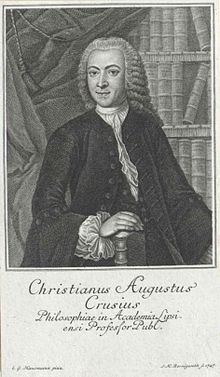Christian August Crusius
aus Wikipedia, der freien Enzyklopädie


Christian August Crusius (* 10. Juni 1715 in Leuna; † 18. Oktober 1775 in Leipzig) war ein deutscher Philosoph und evangelischer Theologe.
Leben
[Bearbeiten | Quelltext bearbeiten]Er war Sohn eines Pfarrers und studierte an der Universität Leipzig Philosophie und Theologie, wo er 1744 außerordentlicher Professor der Philosophie und 1750 ordentlicher Professor der Theologie wurde. Neben Johann Franz Buddeus wurde er zu einem der schärfsten Gegner der Philosophie Gottfried Leibniz’ und Christian Wolffs. Gegen diese verfocht er eine Einheit der positiven Offenbarung und der Vernunft und lehnte den ontologischen Gottesbeweis ab. Würdigung fand er erst spät durch Ernst Wilhelm Hengstenberg und Franz Delitzsch. 1767 übernahm er als erster Leipziger Professor das tutoriale Amt eines Präsident in der 1716 gegründeten Wendischen Prediger-Gesellschaft zu Leipzig und organisierte sie neu: Neben den sorbischen Predigten sollten die Mitglieder auch Vorträge über andere sorbische Themen halten und sich darüber austauschen.
Crusius übte Einfluss auf die kantische Philosophie aus, obwohl Kant letztlich viele crusische Denkelemente ablehnte.[1]
Literatur
[Bearbeiten | Quelltext bearbeiten]- Frank Grunert, Andree Hahmann und Gideon Stiening (Hrsg.): Christian August Crusius (1715-1775). Philosophy between reason and revelation (= Werkprofile, Bd. 11). de Gruyter, Berlin 2021, ISBN 978-3-11-064581-1.
- Martin Krieger: Geist, Welt und Gott bei Christian August Crusius. Erkenntnistheoretisch-psychologische, kosmologische und religionsphilosophische Perspektiven im Kontrast zum Wolffschen System (= Epistemata. Reihe Philosophie, Bd. 126). Königshausen und Neumann, Würzburg 1993, ISBN 978-3-88479-579-8.
- Magdalene Benden: Christian August Crusius: Wille und Verstand als Prinzipien des Handelns. Bouvier Verlag, Bonn 1972, ISBN 3-416-00796-4.
- Giorgio Tonelli: Crusius, Christian August. In The Encyclopedia of Philosophy, hrsg. von Paul Edwards. New York: Macmillan, 1967, Band 2, S. 268–271.
- Arthur Richter: Crusius, Christian August. In: Allgemeine Deutsche Biographie (ADB). Band 4, Duncker & Humblot, Leipzig 1876, S. 630 f.
- Hans Saring: Crusius, Christian August. In: Neue Deutsche Biographie (NDB). Band 3, Duncker & Humblot, Berlin 1957, ISBN 3-428-00184-2, S. 432 f. (Digitalisat).
- Friedrich Wilhelm Bautz: Crusius, Christian August. In: Biographisch-Bibliographisches Kirchenlexikon (BBKL). Band 1, Bautz, Hamm 1975. 2., unveränderte Auflage. Hamm 1990, ISBN 3-88309-013-1, Sp. 1174.
- E. Schwarz, Paul Tschackert: Crusius, Christian August. In: Realencyklopädie für protestantische Theologie und Kirche (RE). 3. Auflage. Band 4, Hinrichs, Leipzig 1898, S. 344–345.
- Johann Jakob Haid: Neue Sammlung von Bildnissen, gelehrter um die Kirche, um das gemeine Wesen und um das Reich der Wissenschaften verdienter noch lebender Männer. Augsburg 1757 (ora-web.swkk.de).
- Henry Sturt: Crusius, Christian August. In: Encyclopædia Britannica. 11. Auflage. Band 7: Constantine Pavlovich – Demidov. London 1910, S. 552 (englisch, Volltext [Wikisource]).
Weblinks
[Bearbeiten | Quelltext bearbeiten]- Literatur von und über Christian August Crusius im Katalog der Deutschen Nationalbibliothek
- Christian August Crusius im Internet Archive
- The Birth of Ontology. A selection of Ontologists from 1560 to 1770
- Christian August Crusius im Professorenkatalog der Universität Leipzig
Einzelnachweise
[Bearbeiten | Quelltext bearbeiten]- ↑ Giorgio Tonelli: Kant’s Ethics as a Part of Metaphysics: A Possible Newtonian Suggestion? with Some Comments on Kant’s “Dreams of a Seer”. In: Craig Walton (Hrsg.): Philosophy and the Civilizing Arts: Essays Presented to Herbert W. Schneider. Athens 1974, S. 255.
| Personendaten | |
|---|---|
| NAME | Crusius, Christian August |
| KURZBESCHREIBUNG | deutscher evangelischer Theologe und Philosoph |
| GEBURTSDATUM | 10. Juni 1715 |
| GEBURTSORT | Leuna |
| STERBEDATUM | 18. Oktober 1775 |
| STERBEORT | Leipzig |
Text is available under the CC BY-SA 4.0 license; additional terms may apply.
Images, videos and audio are available under their respective licenses.
